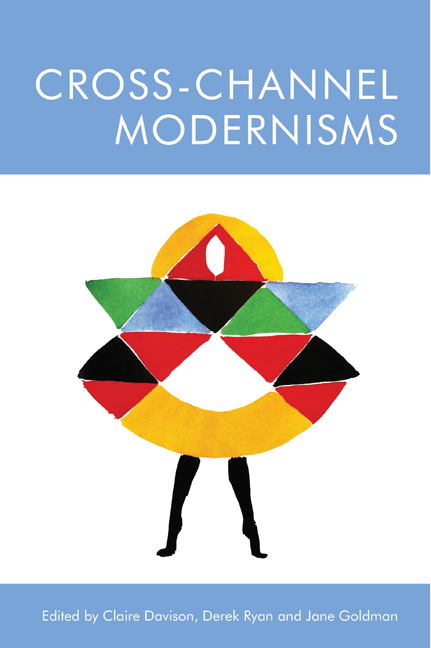Book contents
- Frontmatter
- Contents
- List of Figures
- Notes on Contributors
- Introduction: Cross-Channel (Transmanche) Modernisms
- Interlude: Translating
- 1 On Unknowing French? Rhythm and Le Rythme on a Cross-Channel Exchange
- 2 Impressions of Translation: Ford Madox Ford’s Cosmopolitan Literary Crossings
- 3 Sydney Schiff and Marcel Proust: Table-talk, Tribute, Translation
- Interlude: Fashioning
- 4 Cross-Channel Modernisms and the Vicissitudes of a Laughing Torso: Nina Hamnett, Artist, Bohemian and Writer in London and Paris
- 5 Jean Rhys’s comédie anglaise
- 6 Betray to Become: Departure in James Joyce’s A Portrait of the Artist as a Young Man
- Interlude: Mediating
- 7 Close Up and Cross-Channel Cinema Culture
- 8 Debussy at the Omega Workshops
- 9 Across the Other Channel: Elizabeth Bowen and Modernist Mediation
- Coda: ‘You, who cross the Channel’: Virginia Woolf, Departures and the Spectro-Aesthetics of Modernism 215
- Index
7 - Close Up and Cross-Channel Cinema Culture
Published online by Cambridge University Press: 03 October 2020
- Frontmatter
- Contents
- List of Figures
- Notes on Contributors
- Introduction: Cross-Channel (Transmanche) Modernisms
- Interlude: Translating
- 1 On Unknowing French? Rhythm and Le Rythme on a Cross-Channel Exchange
- 2 Impressions of Translation: Ford Madox Ford’s Cosmopolitan Literary Crossings
- 3 Sydney Schiff and Marcel Proust: Table-talk, Tribute, Translation
- Interlude: Fashioning
- 4 Cross-Channel Modernisms and the Vicissitudes of a Laughing Torso: Nina Hamnett, Artist, Bohemian and Writer in London and Paris
- 5 Jean Rhys’s comédie anglaise
- 6 Betray to Become: Departure in James Joyce’s A Portrait of the Artist as a Young Man
- Interlude: Mediating
- 7 Close Up and Cross-Channel Cinema Culture
- 8 Debussy at the Omega Workshops
- 9 Across the Other Channel: Elizabeth Bowen and Modernist Mediation
- Coda: ‘You, who cross the Channel’: Virginia Woolf, Departures and the Spectro-Aesthetics of Modernism 215
- Index
Summary
The film journal Close Up was published between 1927 and 1933 and edited by Bryher [Annie Winifred Ellerman] and Kenneth Macpherson (the young Scottish artist with whom Bryher entered into a ‘marriage of convenience’ in 1927, after he and her life-long companion, the poet Hilda Doolittle (H.D.), who also contributed substantially to the journal, began a relationship). The journal played a significant role in the development of film culture at a time of rapid expansion and transformation in cinema history, traversing as it did the uncertain years of the transition from silent to sound film. The perceived backwardness of films, film theory and film culture in Britain compared to France, Germany and the Soviet Union was one of Close Up's main concerns; the location of its editors in Territet, Switzerland provided rapid access to international cinema, with Switzerland and Germany relatively unaffected by the censorship which prevailed elsewhere.
Close Up's internationalism is revealed in its spread of correspondents across Europe and the USA, its wider pool of contributors, many of whom were participants in film industries in a range of national contexts, and its extensive coverage of European and, to a lesser extent, British and American cinema. It also published articles by some of the most important film-makers and theorists of the period, making available the first English-language versions of articles by Sergei Eisenstein. Soviet cinema became of particular importance to the journal, which published numerous stills from films that were banned in Britain. Bryher's Film Problems of Soviet Russia, one of the first studies of Soviet film, was published under the POOL imprint which included Close Up.
Close Up's cultural and national identifications have been a matter of some debate, in part because of its highly critical attitude towards British cinema, film culture and criticism and its missionary zeal in relation to their improvement, both of which stances have tended to be poorly received by historians of British film who have, with good reason, pointed to significant films and dimensions of British film culture overlooked by the journal's often hyperbolic criticisms.
- Type
- Chapter
- Information
- Cross-Channel Modernisms , pp. 162 - 183Publisher: Edinburgh University PressPrint publication year: 2020



